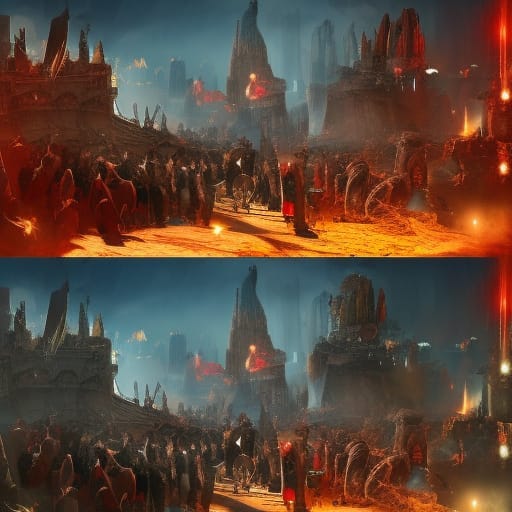Huwara, Purim, and Protests
Different perspectives on massacres and demonstrations
(Image generated by Nightcafe)
This is a very, very difficult post to write. And I am likely to get very heated criticism, some from people slamming me as a fascist right-winger, and some from people slamming me a traitorous leftist. Nor does getting it from both sides necessarily prove that I have taken the correct balance. But I feel a duty to write this post, and I ask those who strongly disagree to at least give it serious thought. (I am also incorporating ideas from an extremely thoughtful discussion by Sara K. Eisen.) To play it on the safe side, the second (and most significant) half of this post will only be available to paid subscribers (remember that the funds go entirely to supporting the Torah and Nature Foundation, which both those on the right and those of the left surely acknowledge as a good cause!)
Israel is going through a very rough time right now. Most people are very upset, for one or more (but rarely all) of the following reasons - the murder of several Jews, the burning of Huwara by local Israelis, the anti-patriotism of those who care more about Huwara than about Jews being attacked, the effective neutering of the Supreme Court’s ability to provide checks and balances to the government, the excesses of the anti-government protests.
Interestingly, some issues similar to these are raised in Purim. (Note that I will be speaking in broad strokes; the correlations between perspectives on Purim, Huwara and the judicial reforms, or even between just the latter two, are not necessarily exactly as I present them here.) In the victorious conclusion of Megillat Esther, we find that after Haman’s decree against the Jewish People is revoked, and they are spared from destruction, they do not leave matters at that. Instead, having obtained royal permission to strike their enemies, including women and children, the Jews kill over seventy-five thousand people!
How are we to understand this? There have been a variety of views given by Jewish scholars. This itself is significant - it means that there is no single view on such things. As Jonathan Haidt has demonstrated in his extraordinarily important book, The Righteous Mind: Why Good People Are Divided By Politics And Religion, there is no single barometer of morality. And this is true not only between religions, but even within traditional Judaism.
Let us first examine the crucial verse in which the Jews are granted license for the massacre:
“By these the king authorized the Jews who were in every city to gather themselves together, and to stand for their life, to destroy, to slay, and to annihilate, any armed force of any people or province that would attack them, little children and women, and to plunder their goods.” (Esther 8:11)
There are several significant points to be noted here. One is that they were being given permission to attack those that might attack them. Contrary to those who would see the massacre as an act of revenge, it is presented instead as precautionary self-defense. Rabbi Mordechai Ventura notes that “these people that they killed in Shushan were haters of Israel, who would always tell the Jewish People that they were going to kill them and smite their young.”[1] In other words, while there was a reprieve from Haman’s plan, there was no guarantee that such a danger would not arise again. There was an ever-present danger of antisemites gaining permission to engage in wanton slaughter of Jews. Had Haman’s decree not been rescinded, there is no doubt that these antisemites would have gladly taken the opportunity to slaughter all the Jews! Since the Jews were given a unique chance to attack their enemies, it was appropriate to take the opportunity to kill those people who would undoubtedly take the opportunity to kill them if such an opportunity would ever arise. Furthermore, this was the only way to actually counter the decree – in verse 8:3 Achashverosh points that an edict sealed with the king’s signet ring may not be revoked. Thus, Haman’s decree could not be cancelled, only circumvented – by authorizing the advance killing of those who would fulfill it.
But what about with regard to the women and children? Surely they didn’t present an active threat - what is the justification for killing them? There are several possibilities to consider, and each reflects the different perspectives on current events.
Keep reading with a 7-day free trial
Subscribe to Rationalist Judaism to keep reading this post and get 7 days of free access to the full post archives.



